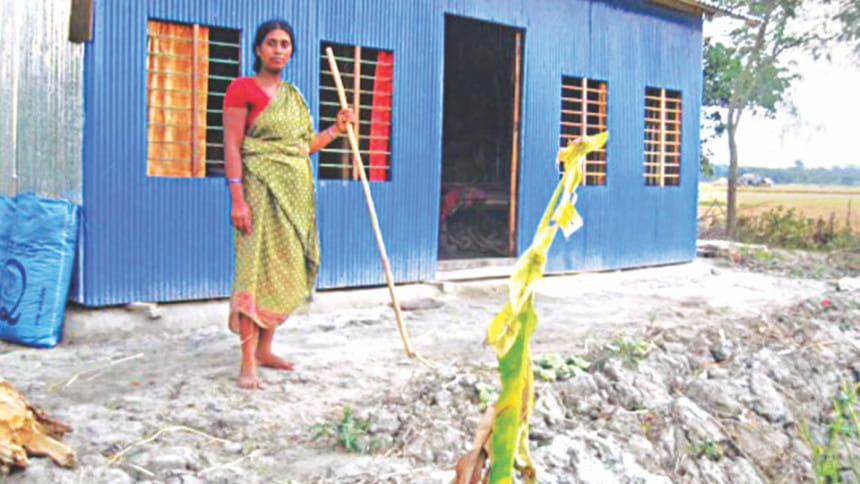KNOWLEDGE FOR LIFE

Bangladesh, along with the global community, is observing the International Day for Disaster Reduction (IDDR). This year, with our Honourable Prime Minister Sheikh Hasina being awarded UN's highest environmental accolade 'Champions of the Earth' in the policy Leadership category, the day for disaster reduction calls for a special momentum.
This year's theme is 'Knowledge for Life' with a focus on the importance of indigenous knowledge in disaster management. Indigenous knowledge is acquired through years of experience by trial and error. It is an integral part of the local ecosystem. Indigenous knowledge has been in use to protect, preserve and promote the ecosystem and thereby reduce disaster risk and related loss. It is often called the 'people's science' or 'social capital'. This is an asset for local communities, useful for investment in their fight for survival and access to food, shelter and basic health care.
Disaster risk reduction and the role of knowledge are inseparable. Information about nature helps reduce loss and tackle the consequences of natural disasters. The more prepared we are, the less of a loss we incur. A basic level of understanding and a set of diversified skills are needed to support us in the fight for survival.
According to the World Development Report 1998/1999, this is why knowledge over capital is the key to sustainable social and economic development. Indigenous knowledge has some distinguishing features. Among these the prominent ones are: a) accumulated over generation b) transmitted through imitation and demonstration c) practical rather than theoretical d) constantly changing and functional e) situated within the broader cultural setting f) not always right and needs validation and articulation and g) useful rather than analytical.
In addressing disaster risk we need both modern and traditional knowledge and tools to ensure cost effective, culturally acceptable, contextualised and sustainable solutions. Knowledge sharing is a two-way street. Traditional, local knowledge can be exchanged with sophisticated, modern knowledge. We are rich in practices and experiences of dealing with changing climate conditions. Culturally approved knowledge of our location may be a useful tool for other locations of the country or other parts of the world.
Local knowledge covers a wide range, from agriculture, herbal or plant medicine, soil health, animal husbandry, ecosystem management, flood and cyclone management to disaster forecasting. This indicates the diversity and strength of our traditional knowledge and practices. In Bangladesh indigenous knowledge related to weather, climate and agriculture is reflected in various documents, literary pieces and practices (Khanar Bachan, folk songs of all kinds, floating seedbeds, stilt house, earthen embankment supported by bamboo fence, grass planting for reducing erosion, shifting cultivation time, disaster resilient rice varieties like hori dhan paddy).
The world is facing disasters with an increased frequency and intensity. In such a context we need to apply and invest whatever we have. Modern scientific knowledge is necessary but not sufficient to address the challenges created through consumption and production patterns. The present development processes, initiatives and actions may improve the quality of life but only for a short period of time; and as time passes we see emerging insurmountable problems for present and future generations. This is why human beings are in search of durable solutions, and indigenous knowledge is one of the solutions now recognised as part of global knowledge that can be utilised in order to achieve sustainable development.
However, indigenous knowledge is not without its challenges. Development priority and process, unregulated market mechanism, governance, legacy of colonial rule, external untested advice and the absence of intellectual and proprietary rights are some of the hurdles.
There is no doubt about the use and potential of indigenous knowledge in protecting our lives. What needs to be done is:
a) Identification of useful traditional local knowledge b) Documentation and recording of indigenous knowledge and practices c) Dissemination through all channels and encouragement of the use of information in saving lives, preserving livelihood d) Mainstreaming indigenous knowledge in our development process and e) Implementing indigenous knowledge where benefits can be maximised.
We may be poor economically but our accumulated knowledge, practices and capacities are richer and more diversified than many developed countries. To achieve resilience we need to preserve local knowledge as well as protect the indigenous people. They must be recognised as our asset.
The writer is an Additional Secretary and National Project Director, Comprehensive Disaster Management Programme (CDMP II), Ministry of Disaster Management & Relief, Government of Bangladesh.
Email: [email protected]

 For all latest news, follow The Daily Star's Google News channel.
For all latest news, follow The Daily Star's Google News channel. 



Comments